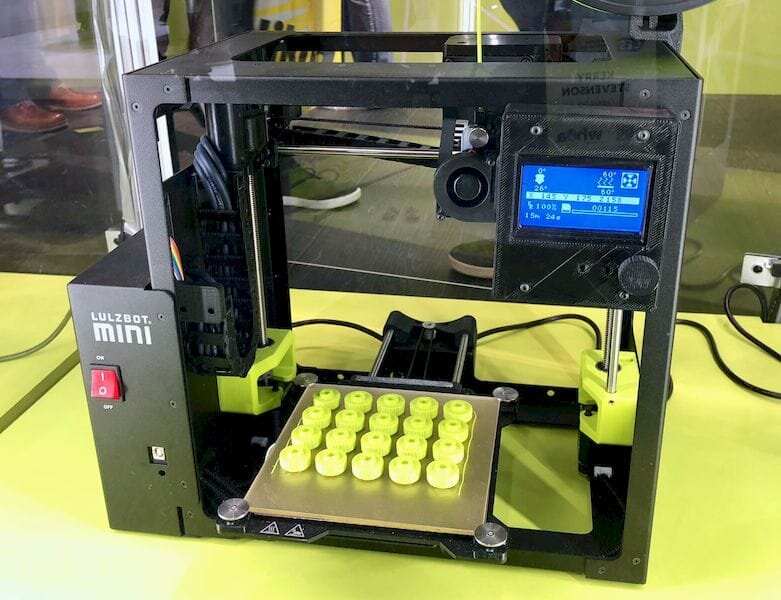![The LulzBot Mini desktop 3D printer [Source: Fabbaloo]](https://fabbaloo.com/wp-content/uploads/2020/05/image-asset_img_5eb08d24cfc7e.jpg)
For those still working with LulzBot, the past few weeks must have been a whirlwind of emotions.
A few weeks ago the company behind LulzBot, Colorado-based Aleph Objects, suddenly announced a rather dramatic layoff in which the majority of the staff were sacked. This left a skeleton crew whose objective was to sell off existing inventory and hope to find a buyer for the brand.
LulzBot Investigation
After this sudden announcement, we did a bit of an investigation to find out what was going on behind the scenes, and eventually ended up having an exclusive interview with Aleph Object’s founder, Jeff Moe. Regarding the sale of Aleph Objects, Moe said to us:
“We’re looking for a buyer before the 31st [of October] and we have a few people we’re talking to; there are a few people on the hook we’ve worked with for years, so that’s certainly a possibility.”
LulzBot Sale
That goal came true this past weekend, as the assets of LulzBot and at least some of their remaining staff were acquired by North Dakota-based FAME 3D. It’s not quite clear how this will play out, but at the least it’s better news for fans of the very popular LulzBot equipment.
Future of Open Source Hardware
As the LulzBot story moves along, I am contemplating how this event may affect the future of open source companies, as Aleph Objects was one of the foremost proponents of that business model, going even as far as developing an open source 3D printer filament.
Open Source Hardware Business Model
The business model for an open source hardware company is quite a bit different from earlier proprietary business models, which keep their product designs secret. A secret product design is a kind of monopoly where buyers, if they like the design, have only one source to purchase it from.
Alternatively, an open source business openly posts its product designs for all to use. The idea is that others may offer improvements to the design, which builds upon all enhancements to result in a better product in the end. The open source hardware company must then attempt to sell physical instances of the design to the public, even though in theory anyone can access the same design and build their own unit.
Whereas a traditional company is essentially selling access to the design, the open source hardware company cannot. Instead, the open source hardware company must sell service, convenience, cost and speed.
Those are factors beyond the machine itself, and make up part of the total cost of machine acquisition and operation over its expected lifetime. In other words, even though you could build the machine on your own using the freely available design files, it may be a lot faster, cheaper and even of better quality to buy a completed unit from the open source hardware company.
After all, they should know best how to put the machine together, and their size should allow economy of scale in obtaining components used in the build, thus lowering cost.
Open Source Hardware Business Challenges
This is a tricky thing to do, as open source hardware companies must strongly emphasize service and cost. If they don’t, then someone else will simply start making the same machine and beat them at their own game.
This is precisely what happened to MakerBot years ago, when they discovered their open source machine designs were being used to build dramatically cheaper “clones” in Asia, undercutting their market. MakerBot, who had then just received substantial venture capital investment, was forced to react by their investors and ultimately transformed from an open source company into a closed source company much to the disappointment of their legions of followers.
Aleph Objects was presumably in a similar situation, although their designs may not have specifically been used to build clones. Instead, they faced armies of competitors worldwide, each with their own designs and able to produce inexpensive and reliable machines at the same or even lower cost. To keep up with that highly competitive market, any company would have to be constantly innovating, lowering prices and continuing to provide outstanding service.
In the end it appears that Aleph Objects was not able to do so in the face of aggressive competitors and made the decision to sell their assets.
LulzBot Affect On Open Source Hardware Ventures
I’m wondering how this event could affect future open source hardware 3D printing ventures. With two notable open source hardware players, MakerBot and now LulzBot, both unable to proceed with their original open source business model, whether anyone else will attempt to pursue the same strategy.
Of course, there are some smaller players doing so, but it’s an open question as to whether they will ever be able to grow to the size of LulzBot’s brand. One large remaining open source player that is succeeding so far, is Prusa Research, who have been able to thrive, growing exponentially in the past few years.
The secret to Prusa Research’s success is largely due to their excellent service and customer interfaces. They make reliable products that are relatively easy to use, and keep their costs down. Their vast size now enables them to achieve economies of scale that few others could hope to match.
No More Open Source Hardware Ventures?
This to me suggests that it may be a long time before we see another large-scale open source hardware 3D printer manufacturer: venture capital is unlikely to invest given the previous experiences, cutting off a major source of growth capital for such companies and likely relegating them to smaller futures.
The window for starting new open source 3D printer ventures may now be closed.

